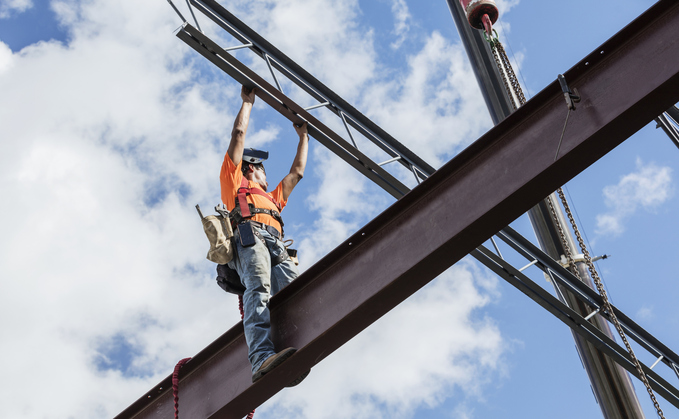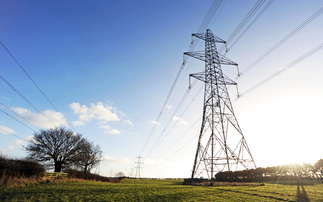
Steel is a critical component of clean energy technologies, buildings and electric cars | Credit: iStock
UK Steel argues hydrogen, electrification, and CCS technologies can deliver a thriving domestic green steel industry in the UK
As demand for steel for wind turbines, battery storage systems, solar panels, and other clean energy technology solutions soars, the UK has a chance to establish itself as the world's first fully decarbonised steel industry.
That is the view of trade body UK Steel, which has today published a report that sets out how the UK could grasp a "tremendous first mover advantage" if government and industry work together to decarbonise the sector as it expands to meet growing demand for the metal.
Echoing the recommendations of a report published yesterday by liberal conservative think tank Bright Blue, UK Steel said the government should work to shield steel makers from the UK's high industrial electricity prices, while stimulating the nascent market for low carbon steel. It sets out the case for a sweeping policy package that would incentivise the reuse of scrap steel and curb exports of the waste material, drive investment in emerging green steel production technologies, and introduce measures to discourage steel buyers from importing high carbon steel products from abroad.
The report, which was requested from industry by the government last year, argues the decarbonisation of steel presents a major opportunity to reindustrialise the UK whilst creating a raft of green jobs, noting that demand for finished steel is expected to grow from 9.4Mt in 2015 to 11Mt in 2030 by 2030.
Commenting on the publication of the report - titled Net Zero Steel: A vision for the future of UK steel production - UK Steel director general Gareth Stace said there was an opportunity to transform almost 35,000 steel jobs into green jobs if the UK became the first steel sector to operate with net zero emissions.
"These roles already underpin communities that have made steel for a century," he said. "By moving them to green jobs, we secure the future of these local economies for the long term and support high-paying jobs in areas that have historically suffered from a lack of investment. We can ensure that Teesside, Scunthorpe, and South Wales can lead the world in net zero steelmaking."
The report comes the day after think tank Green Alliance published a report arguing that the UK steel industry should commit to reducing its emissions by 85 per cent by 2035, in exchange for government announcing a string of measures that cut the sector's electricity prices, boost demand for low carbon steel, and encourage more reuse and less exports of scrap steel.
The think tank argued the steel sector should press ahead with plans to replace the blast furnace method of production with electric arc furnaces that could produce steel with low emissions from recycled scrap metal, or from iron ore that has been reduced in a shaft furnace using low carbon hydrogen gas.
But it noted that carbon capture technology should be approached with caution, arguing that fitting high carbon blast furnaces with CCS risks locking in aging fossil fuel-based infrastructure, maintaining the UK's reliance on coal imports, and incurring high operational costs that would be unlikely to decrease over time.
However, UK Steel's report mapped out a potentially larger role for carbon capture and storage technology in a decarbonised steel sector, identifying it as "one of two main technology routes available", alongside electrification, to reduce emissions between now and 2035. The report argues decarbonisation from 2035 onwards would then likely be delivered through hydrogen-based steel making.
Stace said there was no silver bullet for delivering the decarbonisation of the steel industry. "There is not one single technology to decarbonise, but a range, including electrified steelmaking, carbon capture and storage and hydrogen," he said. "We export much of our scrap steel only to reimport it, meaning there is fertile ground for electric arc steelmaking. Our location near the North Sea means we are perfectly placed to harness cost-effective carbon capture and storage steelmaking. In the future, hydrogen-based steelmaking may also become more attractive."
Stace said it was critical the next Prime Minister accelerated the development of clean steel capacity. "The current administration is making real, tangible progress on this," he said. "The next Prime Minister should accelerate the progress already made to deliver on its net zero goals, for sectors like steel. The future of the steel industry in the UK depends on it."
However, MPs on the Environmental Audit Committee (EAC) this morning offered a less favourable assessment of the current administration's progress on decarbonising steel, noting that government's actions to decarbonise the emissions intensive sector would fail to drive much needed emissions cuts in the short term.
Committee chairman Phillip Dunne noted that all the actions planned by government could take years before they resulted in a meaningful drop in emissions. "While the positive sentiments expressed here are welcome, the actions the government is planning all have long lead times," he said. "This is particularly true for the incorporation of hydrogen in production, and there are numerous carbon-intensive processes - such as the continued need for coking coal for certain steel products - where the government needs to work actively with the sector to pick up the pace."
On 29 June, a letter from Business Secretary Kwasi Kwarteng to Dunne which pointed to various programmes designed to enable industrial decarbonisation, including the Industrial Energy Transformation Fund, the Net Zero Hydrogen Fund, and Ministers' ongoing work to establish business models for the nascent hydrogen market.
Dunne expressed hope that UK Steel's new roadmap would help pave the way for progress on near-term decarbonisation in the sector. "The suggestions to further net zero steel are carefully considered with a clear timeframe of when various policy interventions are required," he said. "I hope this important document clears progress on the path towards green steel before the UK market is eclipsed by progress in steel decarbonisation abroad."
He added that it was commendable that Ministers were exploring the avenues to decarbonise green steel, arguing there was major potential for the UK to be a global leader on clean steel production.
"I hope Ministers fully grasp this challenge and help support the UK steel industry in its quest to be a world leader in green steel: we know the UK has this potential," Dunne said.









